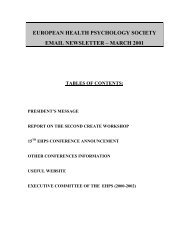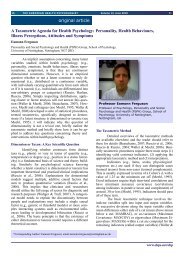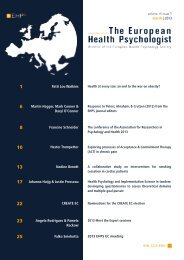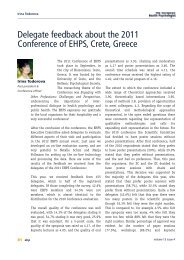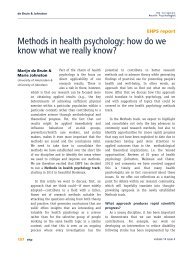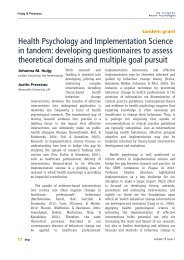PDF download entire issue - European Health Psychology Society
PDF download entire issue - European Health Psychology Society
PDF download entire issue - European Health Psychology Society
Create successful ePaper yourself
Turn your PDF publications into a flip-book with our unique Google optimized e-Paper software.
www.ehps.net/ehp<br />
time-sampling in health psychology<br />
memory of using this strategy to gauge an<br />
average rating. Related, individuals may also<br />
draw on particularly salient problems when<br />
rating their overall coping strategy use (Schwarz,<br />
1999). Finally, honest forgetfulness may further<br />
distort average reports on coping with problems.<br />
The use of cognitive heuristics as outlined in the<br />
previous examples may provide a biased<br />
representation of the behaviour or experience<br />
under focus. To minimize the operation of<br />
retrospective biases, time-sampling research<br />
assesses thoughts, behaviours, and feelings as<br />
they occur. It therefore does not place the same<br />
demands on an individual’s memory and it<br />
incorporates current situational influence as part<br />
of the design. Taken together, time-sampling<br />
methods may advance health psychological<br />
research because they (1) target daily life<br />
processes as they occur in an individual’s own<br />
environment, (2) facilitate the detection of timeordered<br />
relationships, (3) allow studying<br />
processes that occur on different time-scales,<br />
and (4) reduce problems associated with<br />
retrospective self-reports. Time-sampling<br />
methods therefore provide novel means of<br />
addressing multiple types of health psychological<br />
research questions because they uniquely<br />
capture daily life variability in study variables of<br />
interest that cannot be investigated using one<br />
time retrospective self-reports.<br />
Conclusion<br />
Time-sampling research has the potential to<br />
offer insights into health psychological<br />
phenomena that could not be obtained using<br />
other methods. It may thus offer valuable and<br />
promising means of contributing to research in<br />
the field of health psychology that may<br />
complement traditional retrospective self-reports<br />
or even experimental approaches. The use of<br />
time-sampling methods is particularly<br />
appropriate when one suspects that a targeted<br />
behaviour or experience changes across different<br />
daily life situations and/or if it is particularly<br />
december | 2011<br />
prone to self-report biases.<br />
In addition, time-sampling research benefits<br />
from a combination of subjective and objective<br />
measures. For example, it might be interesting to<br />
examine how situation-specific changes in<br />
emotional experiences as measured by subjective<br />
self-reports could be associated with important<br />
health behaviours such as physical activity that<br />
can be assessed using accelerometers. We thus<br />
believe that <strong>Health</strong> <strong>Psychology</strong> may benefit from<br />
the implementation of time-sampling research<br />
and that there are many different ways to<br />
capitalize on and extend its potential.<br />
Author note<br />
Preparation of this manuscript was supported<br />
by a Pacific Century Graduate Scholarship, a<br />
Dofasco Inc. First Nations Fellowship, and a<br />
Special UBC Graduate Scholarship - Aboriginal<br />
Graduate Fellowship to Loni Slade. We also<br />
greatly acknowledge the support provided by the<br />
Social Sciences and Humanities Council of<br />
Canada and the Canadian Institutes of <strong>Health</strong><br />
Research to Christiane Hoppmann.<br />
References<br />
Almeida, D. (2005). Resilience and vulnerability to daily<br />
stressors assessed via diary methods. Current Directions<br />
in Psychological Science, 14, 64-68. doi: 10.1111/j.0963-<br />
7214.2005.00336.x<br />
Bolger, N., Davis, A., & Rafaeli, E. (2003). Diary methods:<br />
Capturing life as it is lived. Annual Review of<br />
<strong>Psychology</strong>, 54, 579-616. doi: 10.1146/annurev.psych.54.101601.145030<br />
Bolger, N., & Zuckerman, A. (1995). A framework for<br />
studying personality in the stress process. Journal of<br />
Personality and Social <strong>Psychology</strong>, 69, 890-902. doi:<br />
10.1037/0022-3514.69.5.890<br />
DeLongis, A., & Holtzman, S. (2005). Coping in context:<br />
The role of stress, social support, and personality in<br />
coping. Journal of Personality 73(6), 1-24. doi:<br />
10.1111/j.1467-6494.2005.00361.x<br />
Feldman Barrett, L., & Barrett, D. (2001). An introduction<br />
ehp 68



